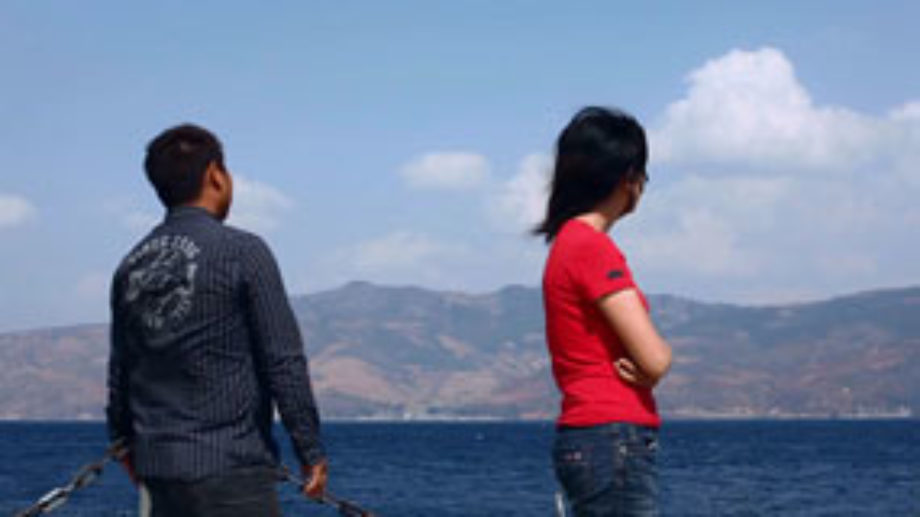
“Finally, a Chinese filmmaker has combined gorgeous, if normally languorous, compositions with a relatively rapid narrative movement,” says Filmmaker Magazine about Huan Huan in a glowing review of New Directors/New Films. Directed by Song Chuan, the independent film screens today at the Film Society and tomorrow at MoMA. Unfortunately, Chuan couldn't make it to the United States due to visa issues, but he was kind enough to answer our questions in detail. [buy tickets]
Send us a picture from your mobile phone of yourself and your environment.
Describe your film Huan Huan to someone who hasn't seen it.
Huan Huan is a film about hope and despair. It's about the choices in life and plight in reality confronting people in contemporary China. The film portrays ordinary citizen's change of values and loss of morality in the process. The heroine Huan Huan wanders and hesitates between two men with the hope of going out of her hometown to find work, but the entanglement makes her more helpless. “Values” is a key word for the film. Based on this, Huan Huan's dilemma reflects some problems we all have encountered before or are contemplating about at present, because we all face the same reality.
What was the most memorable day of shooting like?
The most memorable day was when the DP Wang Xiang and I went to the “red light district” of the town to look for a body double for the lead actress. The body double is very hard to find, as no one in rural China is willing to act nude in an independent film, so we decided to look among sex workers. We searched through the whole red light district of the town that night. Learning we would pay better than their regular services, many sex workers agreed to consider the offer, as long as no actual sex was involved. However, to our surprise, after a night of deliberation all of them refused to act as the body double. Unfortunately we had to present relevant scenes in other manners.
If you could work with any artist alive, who would it be and why?
Woody Allen, Luc Besson, Bresson, Almodóvar–these are all masters in my mind. I would love to work with any of them, because all make me realize films could be made in such a way!
What are you most excited to do while you're in NYC?
For visa reasons, I cannot go to New York and communicate with the audience and media face to face, but I'm very glad my film Huan Huan could premiere in New York.
Describe your very first experience with filmmaking.
I made my first film in college, where the whole class raised money for the shooting. At the time I didn't know much about film, and was motivated by an instinctual desire for images. I had the script ready in advance, which is about some personal life experience. The crew used after-class time for the whole shooting. The equipment was rudimentary but people were very enthusiastic, and treated every detail with equal care. In retrospect I found it a very rewarding experience.
What would you be doing if you weren't making films?
I never thought about it and have no ready answer. I used to paint and write poems, so probably I'll do something culture-related.
What is your favorite (and/or least favorite) movie and why?
I have many favorites and no least favorites–there are only things I don't like. I prefer films with humanistic spirit and concerned about life and reality.
From what types of art, other than film, do you draw inspiration?
For a director, a film is not only based on inspiration. More often I feel touched by reality, and the accumulation of emotions triggers the desire for expression. I also draw support from other art forms to help cinematic expression, like painting and music. I like to be electric and don't stick to a pattern.
What is your favorite food to eat on set?
I never eat on set, only smoke a lot.
Do you have any rituals or rules for yourself while you're working on a film?
No, rituals are impractical for a low budget independent film.
Which parts of the filmmaking process do you enjoy the most? The least?I do everything in the filmmaking process. Independent filmmaking in China faces difficult situation, and does not follow industrialized procedures. The director has to do exhaustive work, but the hard work is enjoyable.
What was the biggest surprise you had while making your film?
We could not fulfill a large part of the shooting plan due to practical difficulties, and were forced to change the original plan. The biggest surprise came with the unexpected inspiration thanks to those changes.
What's your plan for your next film? Will is be the different from Huan Huan?
My second film Yu Bai is in pre-production. It's also a film about life in rural China, focusing on a woman's dilemmas in values and morality. Huan Huan is about a heroine determined to see the outside world, but ending up in deeper despair. Yu Bai tells the story of the heroine Yu Bai going out to the outside world but escaping back. Yu Bai fails to find a sense of belonging either in the city or in the countryside; she cannot adapt to the rural life after her return and falls back to some absurd cycle of life. I look forward to the completion of the film.
Huan Huan screens March 27 and March 28 [buy tickets]. A special thank you to Lulu Chen for the translation!



